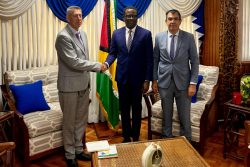As the year comes to a tumultuous end, it is now up to President Granger to show leadership and to demonstrate that the country and constitutional governance will be put above all else – particularly the insular interests of APNU+AFC.
On December 21, 2018, the APNU+AFC administration submitted itself to debate of a motion of no-confidence which was brought in the name of Opposition Leader Bharrat Jagdeo in the aftermath of the results of the November 12th Local Government Elections. At the end of fierce debate and after an attempt at a voice vote, a division was sought and an uproar ensued after APNU+AFC MP Charrandas Persaud voted with the 32 PPP/C MPs, meaning that the no-confidence motion was carried by a tally of 33 to 32. Speaker of the National Assembly, Dr Barton Scotland acknowledged that the motion had been affirmed and official notification of this was later dispatched by the Clerk of the National Assembly to the Opposition Leader.
The consequences of the passage of the motion of no-confidence are addressed in Article 106 of the reformed constitution which deals with Cabinet. Many parts of the constitution are swathed in woolly terminology. This one isn’t and the pithiness of its language makes it clear to all. It states at 106 (6) “The Cabinet including the President shall resign if the Government is defeated by the vote of a majority of all the elected members of the National Assembly on a vote of confidence”.
The only interpretation that can be drawn from 106 (6) is that there must be a majority of all elected members voting in favour of the no- confidence motion for it to succeed. The minimum figure would be 33 and that was attained when Mr Persaud voted with the PPP/C.
The simple equation had already been clear to all sides particularly, the APNU+AFC. During the debate on December 21st, the APNU+AFC Chief Whip Amna Ally alluded to it. In her usual ebullient style, she declared in part: “…a hue and a cry of a no-confidence motion. But I have to tell you honourable members of the opposite side bring it on! Bring it on! The APNU AFC has a solid 33, you have an indecisive 32!” The Chief Whip had apparently been unaware of the indecision on her own side. Prime Minister Nagamootoo, the Leader of the House for Government Business had himself in several interviews prior to the vote stated that the motion would not be carried as there would be no defection from the 33.
It would be the height of crass opportunism and duplicity for this government to argue whether in parliament, the law courts or the court of public opinion that it was fully aware of the consequences of the vote but was now trying to move the goal posts.
In the early hours after the vote, both President Granger and PM Nagamootoo recognized the consequences of the vote. This position later began to change on the presentation of meretricious arguments from attorney Nigel Hughes and others. The arguments make no sense in the Guyana context and betray an intention to play fast and loose with the constitution, the supreme law of the land.
Following the appointment of a Cabinet sub-committee which had been presumed to be working on the way ahead for what should be a caretaker government until elections are held, Cabinet has been presented with what has been described as a Legal Memorandum by Attorney General Basil Williams. The memorandum makes a number of arguments relating to the no- confidence vote and concludes that Speaker Scotland be invited to “reverse the ruling issued” on December 21st. The arguments are unimpressive and it seems that some members of the coalition are flailing at every single possibility of staying in office in defiance of the constitution. It appears that if the Speaker gives short shrift to the government’s argument, the intention is for a legal challenge to be instituted in relation to the motion of no confidence. This would be a retrograde step as it would be seen as a naked attempt to subvert the constitution.
Presumably when President Granger returns from his latest round of treatment for Non-Hodgkin Lymphoma in Cuba, he and his Cabinet will have a further discussion on the legal memorandum which has been presented by Mr Williams. As unwell as he is at the moment, the President now faces the added burden of addressing the consequences of the vote of no confidence on December 21st. To defy the clarity of Article 106 (6) is to jeopardise the primacy of constitutional governance and the rule of law. The President must take a firm decision and lead his Cabinet in favour of adherence to the fundamental tenets of the constitution.







